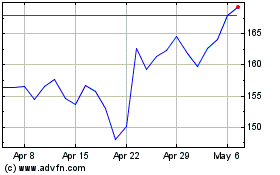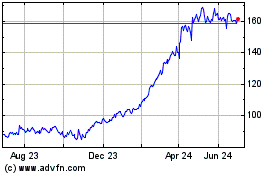By Michael Rapoport and Vipal Monga
General Electric Co.'s novel tax outsourcing-like arrangement
with PricewaterhouseCoopers is the first deal of its kind, but it
may not be the last.
In the days after the Jan. 12 announcement that GE would move
most of its in-house tax staff to PwC by April 1, more than a dozen
other Fortune 100 companies "contacted us saying we want to know
more," said Mark Mendola, PwC's vice chairman and U.S. managing
partner.
That suggests other, similar deals could follow, as complex tax
issues mushroom for big companies and the pace of global change
pushes them to seek outside expert help.
Companies generally are reluctant to discuss such shifts in
their operations before they occur. Several multinational Fortune
100 companies contacted by The Wall Street Journal declined to
comment or didn't respond to questions about whether they might be
considering such a change.
Among companies, "there's a lot of interest in outsourcing that
function to someone who'll take it over," said Ellen MacNeil, a
managing director at Andersen Tax, a global tax-advisory firm.
This type of move stems from a "make-versus-buy decision," she
said "There's various ways companies are meeting the need for
high-quality services."
PwC declined to name any of the companies that have expressed
potential interest in such an arrangement, but the GE agreement
"validated" the idea for them, Mr. Mendola said.
Tax issues facing big companies today make the timing of the
arrangement "ideal," he said. The Trump administration is reviving
discussions of corporate tax reform and floating proposals for a
"border adjustment" to tax imports, but exempt exports, and it may
pursue a tax break to encourage repatriation of corporate profits
held overseas.
The type of cost savings GE expects to realize could encourage
other companies to make similar arrangements. Jeff Bornstein, GE's
chief financial officer, says the PwC deal would save about $100
million a year for the five-year term of the PwC agreement.
The 600 GE employees moving to PwC will do tax work for both GE
and other PwC clients, and GE will receive a share of revenue that
the unit generates for PwC. The deal also gives PwC proprietary
accounting software GE had developed. The GE employees, who work in
New York and Connecticut, will be shifting to PwC offices in those
areas but won't be relocating.
Besides the cost savings, GE says the agreement furthers efforts
to slim down the organization. The company has shed several units
during the past few years, most notably the divestiture of most of
its finance arm, GE Capital, which it announced in 2015.
Mr. Bornstein said the company didn't need as big a tax team
after the GE Capital separation, and the PwC deal was a "more
creative" solution to that issue than layoffs, which would have
cost GE $50 million.
Still, outsourcing a company's tax functions isn't new per se --
many smaller companies have done it for years. But it is rare for a
company such as GE, which is large enough to be capable of handling
its tax functions in-house.
In fact, some observers suggest GE's circumstances may make it a
unique case because not many companies of GE's size suddenly slim
down and find themselves with more tax employees than they
need.
Other accounting and professional-services firms indicated that
clients are seeking more assistance for tax and other services.
Kate Barton, Americas vice chair of tax for EY, or Ernst &
Young, said the firm is "certainly seeing more companies hire
organizations like ours to handle tax, internal audit and many
other business functions they have often done internally."
It is "the direction things have been moving in for quite some
time now, " she said. Companies are trying to cope with "an
increasingly complex environment" and are driven by factors such as
the pace of change around the world -- legislatively, digitally and
financially.
Globalization is a key driver of such arrangements, Ms. MacNeil
said. It is "very difficult" for a company to maintain the tax
expertise it needs when it operates in many global tax
jurisdictions. Industrial companies, where tax work is far removed
from their core operations, also are prime candidates, Mr. Mendola
said.
Some accounting firms offer a partial variant known as
"co-sourcing," in which a firm takes over some of a company's tax
work, such as compliance. The financial firm handles tax functions
that aren't central to a company -- European value-added tax
matters for a U.S.-based company, for instance -- to enable the
company's tax personnel to focus on more-important areas such as
tax strategy.
McDonald's Corp., for instance, has had a tax co-sourcing
arrangement with Deloitte Consulting LLP since 2009. The fast-food
chain has restaurants in 120 countries, and Deloitte handles
hundreds of foreign tax returns and U.S. state and municipal
returns for McDonald's, according to Deloitte's website.
McDonald's didn't respond to requests for comment.
Write to Michael Rapoport at Michael.Rapoport@wsj.com and Vipal
Monga at vipal.monga@wsj.com
(END) Dow Jones Newswires
January 30, 2017 08:14 ET (13:14 GMT)
Copyright (c) 2017 Dow Jones & Company, Inc.
GE Aerospace (NYSE:GE)
Historical Stock Chart
From Apr 2024 to May 2024

GE Aerospace (NYSE:GE)
Historical Stock Chart
From May 2023 to May 2024
